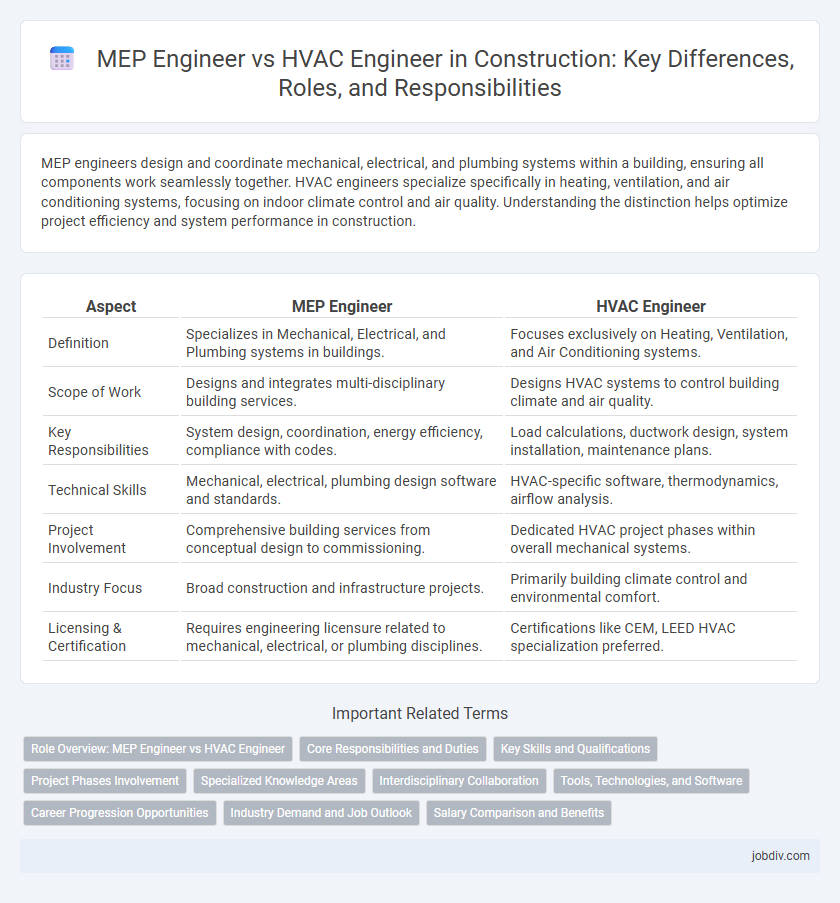MEP engineers design and coordinate mechanical, electrical, and plumbing systems within a building, ensuring all components work seamlessly together. HVAC engineers specialize specifically in heating, ventilation, and air conditioning systems, focusing on indoor climate control and air quality. Understanding the distinction helps optimize project efficiency and system performance in construction.
Table of Comparison
| Aspect | MEP Engineer | HVAC Engineer |
|---|---|---|
| Definition | Specializes in Mechanical, Electrical, and Plumbing systems in buildings. | Focuses exclusively on Heating, Ventilation, and Air Conditioning systems. |
| Scope of Work | Designs and integrates multi-disciplinary building services. | Designs HVAC systems to control building climate and air quality. |
| Key Responsibilities | System design, coordination, energy efficiency, compliance with codes. | Load calculations, ductwork design, system installation, maintenance plans. |
| Technical Skills | Mechanical, electrical, plumbing design software and standards. | HVAC-specific software, thermodynamics, airflow analysis. |
| Project Involvement | Comprehensive building services from conceptual design to commissioning. | Dedicated HVAC project phases within overall mechanical systems. |
| Industry Focus | Broad construction and infrastructure projects. | Primarily building climate control and environmental comfort. |
| Licensing & Certification | Requires engineering licensure related to mechanical, electrical, or plumbing disciplines. | Certifications like CEM, LEED HVAC specialization preferred. |
Role Overview: MEP Engineer vs HVAC Engineer
MEP Engineers oversee the integrated design and implementation of Mechanical, Electrical, and Plumbing systems, ensuring building efficiency and safety. HVAC Engineers specialize exclusively in heating, ventilation, and air conditioning systems, focusing on climate control and air quality. The MEP Engineer manages multidisciplinary system coordination, while the HVAC Engineer concentrates on optimizing thermal comfort and energy efficiency.
Core Responsibilities and Duties
An MEP engineer oversees the design, installation, and maintenance of mechanical, electrical, and plumbing systems within construction projects, ensuring seamless integration and functionality across building infrastructure. HVAC engineers specialize in heating, ventilation, and air conditioning systems, concentrating on climate control, energy efficiency, and indoor air quality optimization. Both roles require expertise in system design and compliance with building codes, but MEP engineers handle a broader spectrum of building services while HVAC engineers focus specifically on thermal comfort and air system performance.
Key Skills and Qualifications
MEP Engineers require expertise in electrical, plumbing, and HVAC systems integration, with a strong understanding of building codes, project management, and CAD software. HVAC Engineers specialize in heating, ventilation, and air conditioning system design, emphasizing thermodynamics, fluid mechanics, and energy efficiency standards. Both roles demand proficiency in AutoCAD and Revit, with MEP Engineers often holding degrees in mechanical or electrical engineering, while HVAC Engineers typically have focused training in HVAC technology and energy management.
Project Phases Involvement
MEP Engineers engage in comprehensive project phases including design development, coordination, and commissioning of mechanical, electrical, and plumbing systems to ensure integrated building functionality. HVAC Engineers specialize primarily in the design, installation, and testing phases related to heating, ventilation, and air conditioning systems, focusing on thermal comfort and energy efficiency. Collaboration during the schematic design and construction documentation phases between MEP and HVAC Engineers optimizes system performance and project delivery timelines.
Specialized Knowledge Areas
MEP Engineers specialize in integrating mechanical, electrical, and plumbing systems ensuring seamless building functionality. HVAC Engineers focus extensively on heating, ventilation, and air conditioning systems, optimizing indoor air quality and energy efficiency. MEP expertise covers system coordination, electrical load calculations, plumbing design, and fire safety, whereas HVAC engineers delve deeper into thermodynamics, refrigeration cycles, and ventilation system design.
Interdisciplinary Collaboration
MEP engineers coordinate mechanical, electrical, and plumbing systems to ensure integrated building performance, while HVAC engineers specialize in heating, ventilation, and air conditioning design and optimization. Effective interdisciplinary collaboration between MEP and HVAC engineers enhances system compatibility, energy efficiency, and indoor air quality in construction projects. Utilizing BIM technology facilitates seamless communication, clash detection, and streamlined project management among all engineering disciplines.
Tools, Technologies, and Software
MEP Engineers utilize integrated design software such as Revit MEP and AutoCAD to coordinate mechanical, electrical, and plumbing systems, ensuring efficient building performance. HVAC Engineers focus on specialized tools like Carrier HAP and Trane Trace for load calculations, airflow analysis, and system optimization tailored to heating, ventilation, and air conditioning. Both professionals leverage BIM technology for clash detection and project collaboration, though HVAC Engineers prioritize energy modeling and equipment sizing specific to climate control systems.
Career Progression Opportunities
MEP Engineers have broader career progression opportunities due to their expertise in mechanical, electrical, and plumbing systems, allowing them to advance into project management, consulting, or specialized engineering roles. HVAC Engineers typically focus on heating, ventilation, and air conditioning systems, which can lead to specialized technical roles or supervisory positions within HVAC design and installation projects. Professionals with multidisciplinary MEP knowledge often experience faster career growth and more diverse job prospects in large-scale construction projects.
Industry Demand and Job Outlook
MEP engineers, specializing in mechanical, electrical, and plumbing systems, continue to see robust industry demand driven by large-scale commercial and infrastructure projects requiring integrated systems design. HVAC engineers focus on heating, ventilation, and air conditioning, with job outlook growth fueled by energy-efficient building initiatives and sustainable technology adoption. The construction industry's increasing emphasis on smart building systems and regulatory compliance further amplifies the need for experienced engineers in both MEP and HVAC fields.
Salary Comparison and Benefits
MEP engineers overseeing mechanical, electrical, and plumbing systems typically command higher salaries due to their broader skill set and project responsibilities, with average earnings ranging from $70,000 to $110,000 annually. HVAC engineers specializing in heating, ventilation, and air conditioning systems earn competitive salaries between $60,000 and $95,000, often benefiting from specialized expertise in energy efficiency and system optimization. Both roles offer substantial benefits, including health insurance, retirement plans, and professional development opportunities, but MEP engineers may access higher bonuses and leadership incentives due to their multidisciplinary involvement.
MEP Engineer vs HVAC Engineer Infographic

 jobdiv.com
jobdiv.com